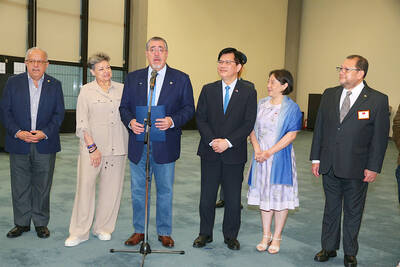Lawmakers from the People First Party (PFP) threatened yesterday to boycott the budget for the Department of Health (DOH) should the top governmental health affairs agency continue to be "negligent" in not overseeing the safety of imported beef from the US.
A second case of bovine spongiform encephalopathy (BSE), or mad cow disease, in the US was confirmed by a British laboratory on Friday, prompting the government to reimpose a ban on imports of US beef from Saturday.
The DOH decided at the same time that US beef already on store shelves in Taiwan is safe and does not need to be removed.
The Consumers' Foundation criticized the DOH harshly Saturday for the department's decision to reopen the Taiwan market to US beef in mid-April, despite concerns expressed by the Council of Agriculture while Japan and South Korea did not do the same thing.
Consumers' Foundation Vice Chairman Cheng Hung-jen (程宏仁) also said that after the second case of mad cow disease was confirmed, the DOH still did not react quickly to demand that all US beef already on local store shelves be recalled. Claiming that the DOH's policy is "absurdly wrong," Cheng said that the foundation will hold DOH officials responsible if any local people are affected by the disease.
In a press conference held at the Legislative Yuan yesterday, PFP legislators Tsai Sheng-chia (
Tsai questioned the DOH's motive and wisdom of reopening Taiwan's doors to US beef two months ago when Japan and South Korea were keeping their bans in place.
Noting that the DOH still decided to reopen Taiwan to US beef imports in April despite Council of Agriculture officials' concerns, Tsai said that DOH officials should take the full responsibility now that a second US case of mad cow disease has been confirmed.
If consumers were to come down with mad cow disease after eating imported US beef, they should be entitled to national compensation since this would be a repercussion caused by wrong government policies, Tsai said.
Lin ridiculed the DOH officials for quoting US beef exporters, even liaison officials, as having guaranteed that US beef is safe despite that a second US case of mad cow disease was still under investigation, asking whether or not it was only a question of what the US said.
Chin Hui-chu (秦慧珠), a PFP whip at the Legislative Yuan, claimed that the Executive Yuan decided to reopen US beef imports soon after President Chen Shui-bian (陳水扁) said that US beef was safe and Taiwan should re-introduce US beef into the domestic market.
Chin wanted a disclosure of the administration's decision-making process concerning the beef reopening to find out who was the real decision-maker.
Taiwan banned imports of US beef, live cattle and all related products in December 2003 after the discovery in Washington State of a single BSE case, the first US case of mad cow disease.
The country lifted the ban on US boneless beef from animals under 30 months of age April 16.

Greenpeace yesterday said that it is to appeal a decision last month by the Taipei High Administrative Court to dismiss its 2021 lawsuit against the Ministry of Economic Affairs over “loose” regulations governing major corporate electricity consumers. The climate-related lawsuit — the first of its kind in Taiwan — sought to require the government to enforce higher green energy thresholds on major corporations to reduce emissions in light of climate change and an uptick in extreme weather. The suit, filed by Greenpeace East Asia, the Environmental Jurists Association and four individual plaintiffs, was dismissed on May 8 following four years of litigation. The

A former officer in China’s People’s Liberation Army (PLA) who witnessed the aftermath of the 1989 Tiananmen Square massacre has warned that Taiwan could face a similar fate if China attempts to unify the country by force. Li Xiaoming (李曉明), who was deployed to Beijing as a junior officer during the crackdown, said Taiwanese people should study the massacre carefully, because it offers a glimpse of what Beijing is willing to do to suppress dissent. “What happened in Tiananmen Square could happen in Taiwan too,” Li told CNA in a May 22 interview, ahead of the massacre’s 36th anniversary. “If Taiwanese students or

DIPLOMACY: It is Guatemalan President Bernardo Arevalo’s first visit to Taiwan since he took office last year, while Eswatini’s foreign minister is also paying a visit A delegation led by Guatemalan President Bernardo Arevalo arrived in Taiwan yesterday afternoon and is to visit President William Lai (賴清德) today. The delegation arrived at Taiwan Taoyuan International Airport at 4:55pm, and was greeted by Minister of Foreign Affairs Lin Chia-lung (林佳龍). It is Arevalo’s first trip to Taiwan since he took office last year, and following the visit, he is to travel to Japan to celebrate the 90th anniversary of diplomatic relations between the two countries. Arevalo said at the airport that he is very glad to make the visit to Taiwan, adding that he brings an important message of responsibility

About 3,000 people gathered at events in Taipei yesterday for an annual candlelight vigil commemorating the 1989 Tiananmen Square Massacre, a brutal crackdown by Chinese authorities on a student-led demonstration in Beijing on June 4 36 years ago. A candlelight vigil organized by the New School for Democracy and other human rights groups began at 7pm on Democracy Boulevard outside Chiang Kai-shek Memorial Hall, with the theme "Resist Transnational Repression, Defy Totalitarianism." At about 8pm, organizers announced that about 3,000 people had attended the event, which featured brief speeches by human rights advocates from Taiwan and China, including Hong Kong, as well